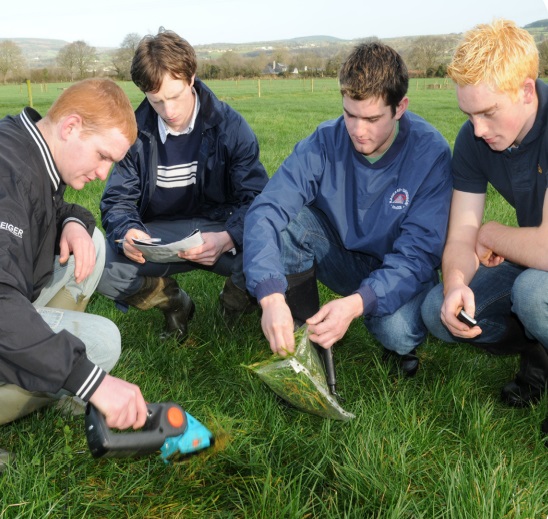Teagasc Education: Frequently Asked Questions
Q What Further Education Courses are available at Colleges and Where?
Fulltime FETAC accredited programmes on offer are:
- Agriculture Level 5 and 6: Ballyhaise, Clonakilty, Kildalton, Gurteen, Mountbellew and Pallaskenry colleges.
- Horticulture Level 5 and 6: College of Amenity Horticulture at the Botanic Gardens and at Kildalton College.
- Equine Level 5 and 6: Kildalton College.
- Forestry Level 5 and 6: Ballyhaise College.
Q What about Part time Green Cert Courses?
In addition to college courses part time education programmes are provided at 12 Teagasc Regional Education Centres. Local part time courses are normally provided for adults seeking the educational qualifications required for Stamp Duty Relief. The part time programmes incorporate a Level 5 Certificate in Agriculture and a Level 6 ‘Green Cert’ course.Approximately 18 part time courses are currently in progress across the country.
Q Where do I get information on part time courses?
Your Teagasc Education Officer will advise you in regard to your education requirements and suitable course options and course availability. See the ‘Know Your Education Officer’ section of the Teagasc website for details of your Education Office
Q What is the Position with ‘Online’ or Distance Learning Programmes?
Teagasc provide a distance learning programme for graduates who already hold a non agricultural major award at Level 6 or higher. This is called the Teagasc Distance Education Green Cert for Non Agricultural Awardholders (these courses are often referred to as ‘online courses’). This programme meets the education requirement for Stamp Duty Relief for young trained farmers.
This distance education programme incorporates a Level 5 Certificate in Agriculture and a Level 6 ‘Green Cert’ course. As the course involves a substantial amount of skill and practical instruction, farm planning and discussion group activities; actual attendance is required for a significant number of contact days. The course normally takes 15 to 18 months to fully complete. Again your Education Officer can advise you on course requirements. (See the “Know Your Education Officer” section)
Details on applications for future courses are normally posted on www.teagasc.ie and any new courses will be advertised nationally. Given the number of courses in progress at the minute no new distance education courses are likely to be scheduled in the coming months.
Q What is the current Minimum Educational Qualification for Stamp Duty Relief?
Under the 2012 Finance Act the minimum agricultural qualification for Stamp Duty Relief on Transfers of Land to Young Trained Farmers is now a FETAC Level 6 Specific Purpose Certificate in Farm Administration also known as a ‘Teagasc Green Cert’. The education path to the minimum required qualification for Stamp Duty is now:
- A Level 5 Certificate in Agriculture plus a Level 6 Specific Purpose Certificate in Farm Administration (also known as a Teagasc Green Cert)
The Revenue Commissioners list a range of other agricultural related qualifications which they also recognise for Stamp Duty Relief. As education qualification requirements for Stamp Duty Relief changed on a number of occasions over the past decade it is vital that you check that your qualifications meet the requirements well in advance of any land transfer.
Q What Education do Teagasc recommend for a Future Commercial Farmer?
Young entrants to intensive commercial farming are advised to complete a specialised Level 6 Advanced Certificate in Agriculture programme e.g. dairy herd management or drystock management or crops or mechanisation at an agricultural college. College’s can you advise on the options available at their college or go to www.teagasc.ie .
Q Should my Daughter take up a Career in Commercial Farming?
Female participation in horticultural and equine courses is high but very low in agricultural courses. This is an issue that farm families need to consider for the future. Teagasc can advise on the education options and would encourage greater female participation in agricultural courses.
Q Can I get A Professional Farm Manager Qualification?
Following the recommendations of the Food Harvest 2020 Report, Teagasc introduced a Level 7 Teagasc Professional Diploma in Dairy Farm Management. This programme is validated by UCD. Go to www.teagasc.ie for more information.
Q What’s New in Horticulture, Equine and Forestry Education?
Horticulture is an important national industry and it is essential that our commercial horticultural skills base is maintained. Teagasc is a key education provider in horticulture both in further education and though its links with higher education partners. Teagasc has substantially redeveloped its Level 6 Advanced Certificate in Horticulture programme with four main streams – Food Production, Nursery Production, Landscaping and Sports Turf.
Teagasc provides high equality education and training for the equine sectors at Level 5 and Level 6. At Level 6 an Advanced Certificate in Horsemanship is offered at Kildalton College. Subject to adequate demand a Level 6 Stud Management programme leading to a Certificate in Equine Breeding may also be offered at a nominated Teagasc centre. The Teagasc Level 5 and 6 forestry courses at Ballyhaise College provide hands on instruction in forestry skills and management and is a very well recognised course within the forestry sector.
Q How important is Teagasc Education to the Farming and Agri-food Sector?
In the region of 1,900 new learners enrol in Teagasc further full time, part time and distance education courses and Teagasc linked higher education courses annually. Over 3,500 learners participate annually in accredited training programmes delivered by Teagasc.
In excess of 5,000 adults attend the wide range of Teagasc accredited and non accredited courses offered to the farming community and industry annually. Teagasc has a major involvement in postgraduate training at Masters and PhD level with some 180 graduates pursuing PhD programmes at any one time.
Do you think there is a viable future for young people interested in farming? Vote in our poll here.
